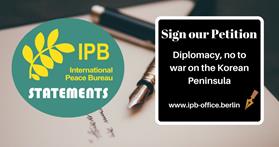To endorse the statement please click here. You will be redicrected to a website, which transfers your encrypted data to us through digital security systems that provide a high level of data protection.
1. IPB condemns U.S., North Korean and other nations’ development possession and threats to initiate nuclear war, as well as any threats to initiate so-called “conventional” war. We demand a diplomatic and non-coercive resolution of the U.S.-Korean crisis.
2. The current U.S.-DPRK crisis and the unacceptable humanitarian consequences of wars and nuclear war lead us to urgently call for an end to military threats and for diplomatic resolution of the crisis. There are no military solutions to this nuclear confrontation.
IPB has long opposed the development, possession, threat and use of nuclear weapons by any state. It has demanded and pressed for the complete elimination of nuclear weapons as called for in the United Nations General Assembly’s first resolution, in numerous subsequent General Assembly resolutions, Article VI of the Nuclear Nonproliferation Treaty, the International Court of Justice’s 1996 Advisory Opinion on the Use and Threatened Use of Nuclear weapons, and in the Nuclear Weapons Prohibition Treaty. It has similarly opposed militarism, wars of intervention, and coercion designed to establish or to reinforce hegemonic rule by foreign nations.
These commitments lead the IPB to strongly condemn North Korea’s nuclear and missile testing, US nuclear intimidation, provocative military exercises and threats to initiate nuclear or other preemptive military attacks against North Korea.
The cycle of reciprocal provocations and rhetorical threats by the U.S. and North Korean governments risk moving beyond control. Such threats can create political dynamics that lead governmental officials to escalate tensions or to initiate military actions. In the context of heightened nuclear alerts, the danger of nuclear accidents or miscalculation greatly increases the dangers of war and nuclear war. In the Northeast Asian context, a U.S.-North Korean military conflict could have disastrous consequences in South Korea, Japan and other Asian and Pacific nations. It could also draw in other nuclear-armed states, Russia, China, and NATO.
With growing fears arising from the crisis, there are increasing and dangerous calls by sectors of elites and popular opinion in Japan and South Korea for their countries to become nuclear powers. North East Asia is now the region in greatest danger of nuclear proliferation. Such developments would increase the possibility of nuclear war and seriously undermine the nonproliferation regime.
3. Diplomacy and mutual restraint are now imperative. Additional nuclear weapons tests by North Korea threaten the release of poisonous radioactive materials that would impact its people, and those of neighboring nations and beyond. Further threats and greater isolation of North Korea through ratcheting up sanctions will obstruct rather than encourage diplomatic engagement and solutions.
The 6 Party talks on Korean denuclearisation are the only existing multilateral framework for negotiations. IPB supports any bilateral or multilateral initiatives to resume these or other talks to advance their key aims.
Securing regional stability also depends on negotiation of a peace treaty to end to the Korean war and, ultimately, negotiation of a Nuclear Weapons Free Zone in North East Asia.
IPB appreciates that some level of communication between the U.S. and North Korean governments is being maintained via North Korea’s delegation to the United Nations. It welcomes the U.N. Secretary-General’s offer to assist in negotiations and his call for the resumption of the Six Party Talks, as well as those of those of the European Union, and the Chinese and Russian governments.
Russia and China, and much of civil society have called for a “freeze for freeze” with the US and Allies suspending military rehearsals for war and North Korea halting its missile and nuclear weapons tests. This appears to be the most promising path to reducing tensions and creating the environment in which negotiations can proceed to finally end the Korean War, and lead to the full implementation of previous agreements for the denuclearization of the Korean peninsula. These in turn can contribute to the further negotiation of a new regional security mechanism to address the security concerns of all and to a Northeast Asia Nuclear Weapons Free Zone.
4. IPB therefore urgently demands that:
* the U.S. and North Korean governments unconditionally agree to engage in negotiations to defuse the crisis
* governments around the world, and the United Nations explicitly reject a military solution to the Korean conflict, oppose the ongoing accumulation of military assets and forces on and around the peninsula; oppose sanctions with damaging humanitarian consequences, and call for mutual restraint as a necessary first step back towards diplomacy and the resumption of the Six Party Talks.
5. We call on IPB member organizations to take up the issue as a matter of urgency, and encourage their members to endorse this statement with its call for mutual restraint through a ‘freeze for freeze’ and a return to diplomacy to achieve denuclearisation and a peace settlement.

